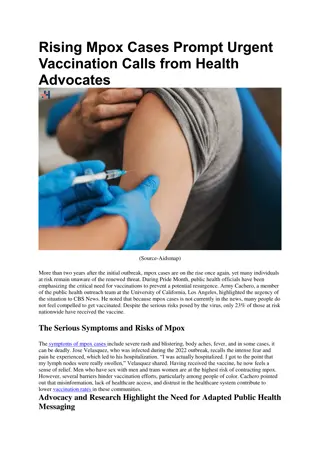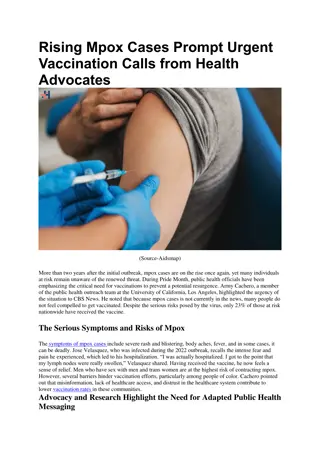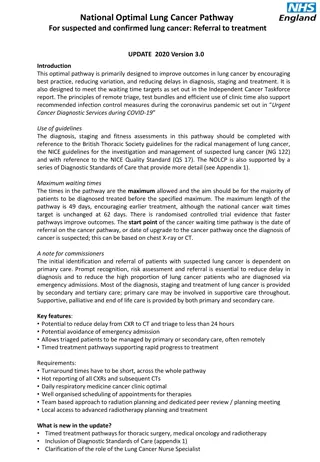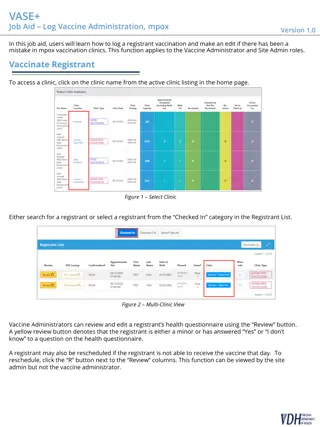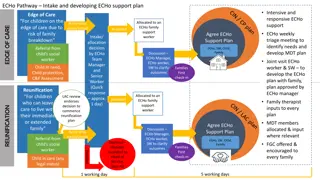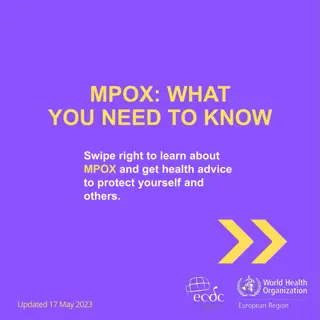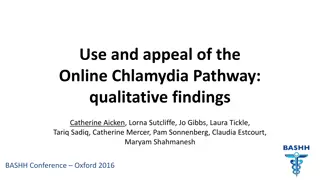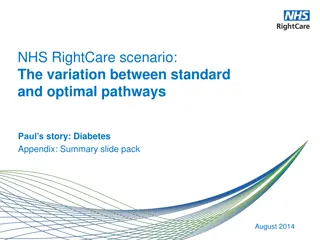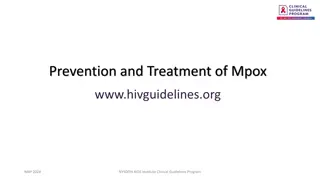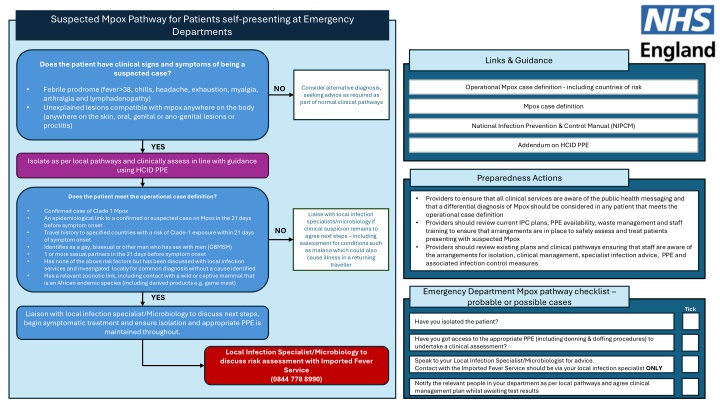
Suspected Mpox Pathway for Patients Self-Presenting at Emergency Departments
Understand the operational case definition and guidance for suspected Mpox cases in patients presenting at Emergency Departments. Learn about the clinical signs, symptoms, and necessary actions to take. Ensure proper isolation, assessment, and infection control measures are in place following the Mpox pathway.
Download Presentation

Please find below an Image/Link to download the presentation.
The content on the website is provided AS IS for your information and personal use only. It may not be sold, licensed, or shared on other websites without obtaining consent from the author. If you encounter any issues during the download, it is possible that the publisher has removed the file from their server.
You are allowed to download the files provided on this website for personal or commercial use, subject to the condition that they are used lawfully. All files are the property of their respective owners.
The content on the website is provided AS IS for your information and personal use only. It may not be sold, licensed, or shared on other websites without obtaining consent from the author.
E N D
Presentation Transcript
Suspected Mpox Pathway for Patients self-presenting at Emergency Departments Links & Guidance Does the patient have clinical signs and symptoms of being a suspected case? Operational Mpox case definition - including countries of risk Operational Mpox case definition - including countries of risk NO Consider alternative diagnosis, seeking advice as required as part of normal clinical pathways Febrile prodrome (fever>38, chills, headache, exhaustion, myalgia, arthralgia and lymphadenopathy) Unexplained lesions compatible with mpox anywhere on the body (anywhere on the skin, oral, genital or ano-genital lesions or proctitis) Mpox case definition Mpox case definition National Infection Prevention Control Manual (NIPCM) National Infection Prevention & Control Manual (NIPCM) Addendum on HCID PPE Addendum on HCID PPE YES Isolate as per local pathways and clinically assess in line with guidance using HCID PPE Preparedness Actions Does the patient meet the operational case definition? Providers to ensure that all clinical services are aware of the public health messaging and that a differential diagnosis of Mpox should be considered in any patient that meets the operational case definition Providers should review current IPC plans, PPE availability, waste management and staff training to ensure that arrangements are in place to safely assess and treat patients presenting with suspected Mpox Providers should review existing plans and clinical pathways ensuring that staff are aware of the arrangements for isolation, clinical management, specialist infection advice, PPE and associated infection control measures Confirmed case of Clade 1 Mpox An epidemiological link to a confirmed or suspected case on Mpox in the 21 days before symptom onset Travel history to specified countries with a risk of Clade-1 exposure within 21 days of symptom onset Identifies as a gay, bisexual or other man who has sex with men (GBMSM) 1 or more sexual partners in the 21 days before symptom onset Has none of the above risk factors but has been discussed with local infection services and investigated locally for common diagnosis without a cause identified Has a relevant zoonotic link, including contact with a wild or captive mammal that is an African endemic species (including derived products e.g. game meat) Liaise with local infection specialists/microbiology if clinical suspicion remains to agree next steps including assessment for conditions such as malaria which could also cause illness in a returning traveller NO Emergency Department Mpox pathway checklist probable or possible cases YES Tick Liaison with local infection specialist/Microbiology to discuss next steps, begin symptomatic treatment and ensure isolation and appropriate PPE is maintained throughout. Have you isolated the patient? Have you got access to the appropriate PPE (including donning & doffing procedures) to undertake a clinical assessment? Local Infection Specialist/Microbiology to discuss risk assessment with Imported Fever Service (0844 778 8990) Speak to your Local Infection Specialist/Microbiologist for advice. Contact with the Imported Fever Service should be via your local infection specialist ONLY Notify the relevant people in your department as per local pathways and agree clinical management plan whilst awaiting test results
Suspected Mpox Pathway for Patients referred to ED for clinical assessment and testing by a Health Care Professional Links & Guidance Patient has been identified as a suspected case of Mpox by a Health Care Professional (including designated medical contacts for Returning Workers) Operational Mpox case definition - including countries of risk Operational Mpox case definition - including countries of risk Mpox case definition Mpox case definition HCP should contact ED to agree arrangements for transfer (e.g. likely time of arrival, arrival point, what to do on arrival, including phone number to notify of arrival) National Infection Prevention Control Manual (NIPCM) National Infection Prevention & Control Manual (NIPCM) Addendum on HCID PPE Addendum on HCID PPE Preparedness Actions Assessment indicates patient is clinically stable and can transport themselves to attend ED via their own transport, whilst maintaining isolation Assessment indicates patient is clinically unwell and should be transported by ambulance, or is unable to self-transfer whilst maintaining isolation Providers to ensure that all clinical services are aware of the public health messaging and that a differential diagnosis of Mpox should be considered in any patient that meets the operational case definition Providers should review current IPC plans, PPE availability, waste management and staff training to ensure that arrangements are in place to safely assess and treat patients presenting with suspected Mpox Providers should review existing plans and clinical pathways ensuring that staff are aware of the arrangements for isolation, clinical management, specialist infection advice, PPE and associated infection control measures Confirm with patient arrangements for transfer Maintain isolation Where to present Who to contact upon arrival HCP to contact regional ambulance service to arrange transfer, clearly stating the patient is a suspected Mpox case HCP Referral Mpox pathway checklist probable or possible cases Tick Have you isolated the patient? Have you assessed the patient's ability to self-transfer? Patient to be managed as per local pathways and in line with Suspected Mpox Pathway for Patients self-presenting at Emergency Departments Have you confirmed transfer/arrival arrangements with the receiving department? Have you confirmed arrangements with the patient, including a phone number to contact upon arrival
Suspected Mpox Pathway for Patients who contact health services by phone or present at a community-based setting Patient has been identified as requiring a clinical assessment to determine if they are a suspected case Links & Guidance Operational Mpox case definition - including countries of risk Operational Mpox case definition - including countries of risk Mpox case definition Mpox case definition Initial assessment of patient to determine whether they are clinically stable or require immediate intervention, in community/outpatient settings (e.g. WIC and community pharmacies) Patients should be isolated/socially distanced and a virtual assessment should take place (e.g. by phone) staff should not physically assess the patient without PPE National Infection Prevention Control Manual (NIPCM) National Infection Prevention & Control Manual (NIPCM) Addendum on HCID PPE Addendum on HCID PPE Preparedness Actions Assessment indicates patient is clinically stable and can remain at home (or return home via their own transport) whilst maintaining isolation Assessment indicates patient is clinically unwell and should be transported by ambulance, or is unable to self-transfer whilst maintaining isolation Providers to ensure that all clinical services are aware of the public health messaging and that a differential diagnosis of Mpox should be considered in any patient that meets the operational case definition Providers should review current IPC plans, PPE availability, waste management and staff training to ensure that arrangements are in place to safely assess and treat patients presenting with suspected Mpox Providers should review existing plans and clinical pathways ensuring that staff are aware of the arrangements for isolation, clinical management, specialist infection advice, PPE and associated infection control measures Advise the patient to dial 999 if urgent, or contact regional ambulance service to arrange transfer, clearly stating the patient is a suspected Mpox case Patient should be advised to return home, maintain isolation and contact 111 Community based Mpox pathway checklist probable or possible cases Tick Where possible isolate/socially distance from the patient 111 pathway implemented Emergency Department Pathway implemented Have you assessed the patient's ability to self-transfer (maintaining self-isolation)? Seek advice from local Infection Prevention & Control as required (e.g. cleaning requirements) Local IPC Guidance contact:
Local IPC Guidance contact: Suspected Mpox Pathway for Patients self-presenting in Primary Care Patient presents to primary care and is identified as at risk of possible Mpox Links & Guidance Does the patient have clinical signs and symptoms of being a suspected case? Febrile prodrome (fever>38, chills, headache, exhaustion, myalgia, arthralgia and lymphadenopathy) Unexplained lesions compatible with mpox anywhere on the body (anywhere on the skin, oral, genital or ano-genital lesions or proctitis) Operational Mpox case definition - including countries of risk Operational Mpox case definition - including countries of risk NO Consider alternative diagnosis, seeking advice as required as part of normal clinical pathways Mpox case definition Mpox case definition National Infection Prevention Control Manual (NIPCM) National Infection Prevention & Control Manual (NIPCM) YES Addendum on HCID PPE Addendum on HCID PPE Isolate the patient in a treatment room with access to a phone and undertake a clinical assessment of the patient Where appropriate PPE is available this can be done in person, where appropriate PPE is not available this should be done virtually Preparedness Actions Where suspected cases present in primary care, General Practitioners should isolate the patient in a single room and contact their local infection service for advice, including immediate precautions in the setting clinical staff should wear face fit tested FFP3 masks, eye protection, long-sleeved fluid resistant gowns and gloves to provide care if immediately required. Providers to ensure that all clinical services are aware of the public health messaging and that a differential diagnosis of Mpox should be considered in any patient that meets the operational case definition Providers should review current IPC plans, PPE availability, waste management and staff training to ensure that arrangements are in place to safely assess and treat patients presenting with suspected Mpox this should include identifying a suitable room and access & egress arrangements Providers should review existing plans and clinical pathways ensuring that staff are aware of the arrangements for isolation, clinical management, specialist infection advice, PPE and associated infection control measures Does the patient meet the operational case definition? Confirmed case of Clade 1 Mpox An epidemiological link to a confirmed or suspected case on Mpox in the 21 days before symptom onset Travel history to specified countries with a risk of Clade-1 exposure within 21 days of symptom onset Identifies as a gay, bisexual or other man who has sex with men (GBMSM) 1 or more sexual partners in the 21 days before symptom onset Has none of the above risk factors but has been discussed with local infection services and investigated locally for common diagnosis without a cause identified Has a relevant zoonotic link, including contact with a wild or captive mammal that is an African endemic species (including derived products e.g. game meat) Liaise with local infection specialists/microbiology if clinical suspicion remains to agree next steps including assessment for conditions such as malaria which could also cause illness in a returning traveller HCP Referral Clade 1 Mpox pathway checklist probable or possible cases NO Tick Have you isolated the patient? Have you assessed the patient's ability to self-transfer? Have you confirmed transfer/arrival arrangements with the receiving department? YES Have you confirmed arrangements with the patient, including a phone number to contact upon arrival Follow the suspected case of Mpox identified by a Health Care Professional Pathway Seek advice from local Infection Prevention & Control as required (including cleaning)







